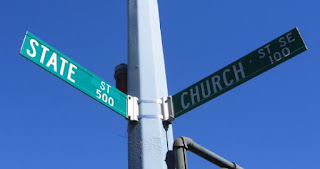[This is an edited version of a post originally published on January 16, 2015]
THE VIRGINIA STATUTE FOR RELIGIOUS FREEDOM
In 1993 President George H. W. Bush declared January 16 to be Religious Freedom Day. January 16 was the date in 1786 when the Virginia House of Delegates passed Thomas Jefferson’s Virginia Statute for Religious Freedom. In 1992, on that date, Virginia Governor L. Douglas Wilder signed the first proclamation to that effect for the Commonwealth of Virginia.
The Virginia Statute for Religious Freedom was a revolutionary document. It ended the state-established church in Virginia and guaranteed religious liberty for all.
Be it enacted by the General Assembly, That no man shall be compelled to frequent or support any religious worship, place, or ministry whatsoever, nor shall be enforced, restrained, molested, or burthened in his body or goods, nor shall otherwise suffer on account of his religious opinions or belief; but that all men shall be free to profess, and by argument to maintain, their opinion in matters of religion, and that the same shall in no wise diminish enlarge, or affect their civil capacities.In his proclamation, the first President Bush wrote:
"...we do well to acknowledge our debt to Thomas Jefferson and James Madison. These two men were instrumental in establishing the American tradition of religious liberty and tolerance. Thomas Jefferson articulated the idea of religious liberty in his 1777 draft Bill for Establishing Religious Freedom in Virginia...THE FIRST AMENDMENT
James Madison later introduced and championed this bill in the Virginia House of Delegates, where it passed in 1786. Following the Federal Constitutional Convention of 1787, James Madison led the way in drafting our Bill of Rights.
The Virginia Statute became the basis for the First Amendment protection of religious liberty.
Jefferson understood the impact of his Virginia Statute. He understood that many people were against acknowledging religious liberty for everyone. In a 2014 column about Religious Freedom Day, Frederick Clarkson wrote:
Thomas Jefferson was well aware that many did not like the Statute, just as they did not like the Constitution and the First Amendment, both of which sought to expand the rights of citizens and deflect claims of churches seeking special consideration.Freedom of belief was for everyone -- religious and non-religious alike -- and, with the passage of the Virginia Statute, and later the First Amendment, it was guaranteed.
So before his death, Jefferson sought to get the last word on what it meant. The Statute, he wrote, contained "within the mantle of its protection, the Jew and the Gentile, the Christian and Mohametan, the Hindoo and Infidel of every denomination."
Thomas Jefferson considered the Virginia Statute for Religious Freedom to be one of the three great accomplishments of his life. He didn't choose to be remembered as Minister to France for the fledgling nation, or as its first Secretary of State, or as its third President. Instead, he chose as his life's three great accomplishments, the Declaration of Independence, the Virginia Statute for Religious Freedom, and the founding of the University of Virginia, and it was those three things that he wished to be inscribed on his tombstone.
RELIGIOUS FREEDOM DAY
Religious Freedom Day is a mostly unheralded event in the United States. It was begun through the urging of the First Freedom Center, whose mission is:
The mission of the First Freedom Center is to commemorate and educate about freedom of religion and conscience as proclaimed in Thomas Jefferson’s Virginia Statute for Religious Freedom.Each President, since the first President Bush in 1993, has issued a proclamation on the occasion of the day.
The quest for freedom of belief is as old as humankind, and it's still ongoing. Recent events have shown us that while human life might be fragile, the conviction of those who would protect the right to free belief is strong.
Americans owe a debt of gratitude to Jefferson, Madison, and all local, state, and national leaders who have worked diligently to uphold the rights protected under the First Amendment.
President Biden's A Proclamation on Religious Freedom Day, 2024 includes the following...
On this day, we recognize that the work of protecting religious freedom is never finished. In our quest to build a more perfect Union, may our faiths and beliefs help us heal divisions and bring us together to safeguard this fundamental freedom guaranteed by our Constitution and to ensure that people of all religions or no religion are treated with dignity and respect.
UPDATED: See also Separating religion and government allows us all to live freely and equally
+++






















